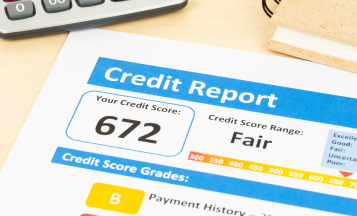Experiencing a serious illness is stressful and responsibilities are sometimes placed on temporary hold until you heal. However, if paying for your medical bills is one of the items placed in the “deal with it later” bucket, there is a strong chance your finances will be impacted by affecting your credit report.
Here's how medical bills affect your credit and what you can do:
Review Bills and Prioritize
Check your medical bills for errors or discrepancies. Make sure you understand the services you received and that the charges are accurate. Also, prioritize payments based on due dates and the provider's willingness to work with you.
Contact Your Insurance Provider
If you have health insurance, review your policy to ensure that the charges are covered. Contact your insurance company if you believe a claim was denied incorrectly or if there's an issue with coverage.

Negotiate with Providers
If you're facing high medical bills, don't hesitate to negotiate with healthcare providers. Ask if they offer discounts, payment plans, or financial assistance for patients in need.
Discuss Payment Plans and Communicate with Providers
Reach out to the billing department and inquire about setting up a reasonable payment plan if you can't pay the full amount upfront. Many providers are willing to work with patients to establish manageable payment schedules.
Apply for Financial Assistance
Some hospitals and medical facilities offer financial assistance programs for individuals with limited income. Check if you're eligible and apply for these programs.
Seek Charity Care
Depending on your financial situation, you might qualify for charity care, which provides reduced or free medical care for eligible patients. Inquire about this option with your healthcare provider or hospital.

Utilize Health Savings Accounts (HSAs) or Flexible Spending Accounts (FSAs)
If you have an HSA or FSA, use those funds to cover eligible medical expenses. This can help you manage medical costs while using pre-tax dollars.
Avoid Paying with Credit Cards
While it might be tempting to use a credit card to cover medical bills, this can lead to high interest charges. Explore other options before resorting to credit cards. If you use a credit card, reach out to your credit card company and tell them about your situation. They may have a program or give you guidance on what to do if you miss payments.
Consider Medical Debt Consolidation
If you have multiple medical bills, you might explore options for consolidating your medical debt into a single manageable loan or payment plan.
Keep Records
Maintain a record of all communication with healthcare providers, insurance companies, and any agreements you make regarding payment plans or financial assistance.
By taking proactive steps and communicating with healthcare providers, you can often find solutions to manage medical bills without negatively impacting your credit score. If you find that you're unable to manage the bills on your own, consider seeking advice from a financial counselor or advisor for personalized guidance. Nymeo works with GreenPath Financial Wellness, which can offer counseling and guide you in the right direction in paying off your medical debt.
Category: Credit & Budgeting



